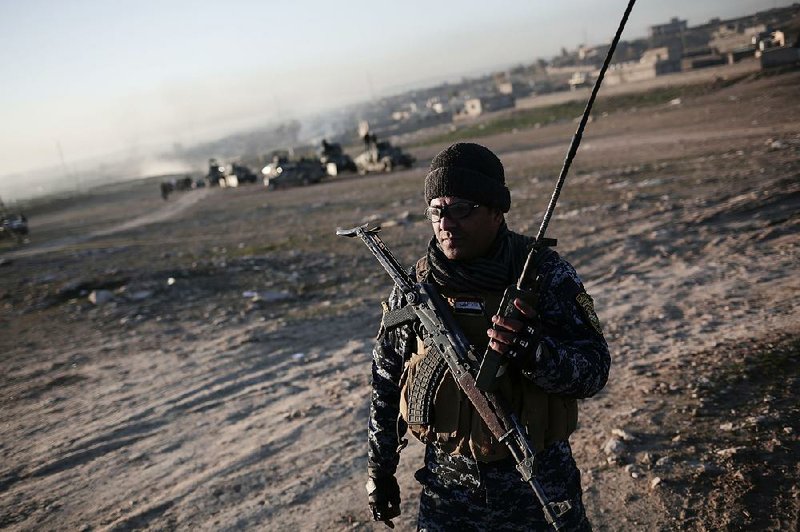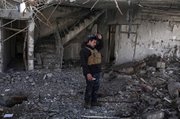HAMAM AL-ALIL, Iraq -- U.S.-backed Iraqi forces launched an air-and-ground offensive Sunday to retake western Mosul from Islamic State militants and drive the extremist group from its last major urban bastion in Iraq.
"It's a new dawn, a dawn of victories," Iraqi Prime Minister Haider al-Abadi said in an address on state television early Sunday, as Iraqi forces, including units from the army, federal police and state-sanctioned militias, advanced on Mosul from the south and west.
The operation aims to reverse the Islamic State's occupation of cities and towns across Iraq since the summer of 2014, a defeat for al-Abadi's predecessor, former Prime Minister Nouri al-Maliki, and a setback that raised doubts about the morale and capabilities of Iraq's military. The latest advance on Mosul comes at a time of rising tension between the Iraqi government and its principal military partner, the United States, over President Donald Trump's administration's decision to halt immigration from seven Muslim-majority countries, including Iraq.
It is also taking place amid new concerns about the condition of hundreds of thousands of civilians still trapped in the western part of the city. Food, water and cooking fuel have all been reported in short supply, and residents have described increased harassment from Islamic State fighters preparing for the attack.
Overnight, planes covered the ground with leaflets, directly appealing to the group's fighters to surrender.
"To those of you who were intrigued by the ISIS ideology," one of the leaflets said, using an acronym for the Islamic State, "this is your last opportunity to quit your work with ISIS and to leave those foreigners who are in your homeland. Stay at home, raising the white flags as the forces approach."
The operation that began Sunday crossed the Tigris River, which bisects Mosul, to move into its western district, where Iraqi commanders expect an even tougher fight, with close-quarters urban combat in narrow streets, through neighborhoods densely packed with civilians.
Ground units pushed into a belt of villages outside the country's second-largest city, and plumes of smoke rose into the sky early in the morning as U.S.-led coalition jets struck militant positions southwest of Mosul and militarized Iraqi police fired artillery.
"This is zero hour and we are going to end this war, God willing," said Mahmoud Mansour, a police officer, as he prepared to move out.
Throughout the night, a steady barrage targeted Islamic State positions just north of the village of Areyj, about 7 miles outside of Mosul.
The operation comes after an overall push to free Mosul that began in October, with local troops pushing from the east into the city's geographically larger but more sparsely populated eastern half. In late January, they reached the banks of the Tigris River and declared the city's eastern section liberated, but the militants continued to stage attacks there, including two suicide bombings against government forces on Sunday.
Because all five of the bridges spanning the Tigris have been bombed, for this operation Iraqi troops traced a circuitous path to western Mosul, initially approaching it from the city's south.
Police units quickly entered the village of Athba, about 3 miles southwest of Mosul's international airport, encountering only light resistance. Separately, the Iraqi Army's 9th Division moved into the village of Bakhira, also southwest of the city, the Ministry of Defense said.
The U.S.-led coalition has been providing close air support throughout the 4-month-old Mosul offensive and carried out nine airstrikes against the Islamic State near Mosul on Saturday, Central Command said. U.S. special operations forces are embedded with some Iraqi units, and thousands of American soldiers are in Iraq to provide logistical and other support.
Despite the sight of U.S. special forces near the front lines, Defense Secretary James N. Mattis said Sunday during a visit to Arab allies in Abu Dhabi there has been no change to rules of engagement regarding U.S. forces' role in the Mosul operation since President Donald Trump took office.
"We are very close to it, if not already engaged in that fight," Mattis told reporters in Abu Dhabi.
He said the U.S.-backed coalition fighting the Islamic State would "continue with the accelerated effort to destroy" the group.
"The isolation phase has been going on for some time now," Mattis said. "The attack into the city is something I don't want to get into details about because I owe confidentiality to the troops who are actually making the attack."
He plans to present the White House with a more aggressive plan to combat Islamic State by month's end, but acknowledged that U.S. airstrikes have pounded Islamic State targets in western Mosul from the air in the days ahead of the Iraqi assault, hitting militant command and control facilities.
Citing witnesses in western Mosul, the United Nations said nearly half of all food shops were closed and bakeries had shut down for lack of fuel and an inability to purchase costly flour. Prices of kerosene and cooking gas have skyrocketed, and many of the most destitute families are burning wood, furniture, plastic or garbage for cooking and heating.
The U.N. also said hundreds of thousands of civilians trapped inside their homes in Mosul "are at extreme risk," with dwindling fuel, food and water and scarce electricity.
"The situation is distressing. People, right now, are in trouble," Lise Grande, the U.N. humanitarian coordinator for Iraq, said in a statement. "We are hearing reports of parents struggling to feed their children and to heat their homes."
Peter Hawkins, of the U.N. agency for children, said: "Three out of five people now depend on untreated water from wells for cooking and drinking as water systems and treatment plants have been damaged by fighting or run out of chlorine."
The humanitarian agencies were gearing up to aid 250,000 to 400,000 civilians who may flee because of the fighting, the statement said. The U.N. estimates that 750,000 civilians may be left in western Mosul.
An advance the Islamic State has made is improving its mastery of the use of small drones, which are available off-the-shelf in malls across the region, including in Irbil, the nearest major city to Mosul. They use the drones to pinpoint army positions and to target them, and recently recovered Islamic State documents show how the group has cobbled together its own drone program. Iraqi forces describe how they frequently see the 2- to 4-foot-long aircraft overhead, whining like a lawn mower. Then 30 minutes later, they will take incoming fire at that location.
Lt. Gen. Stephen Townsend, a top U.S. commander in Iraq, said the Iraqi forces are an "increasingly capable, formidable and professional force."
"Mosul would be a tough fight for any army in the world, and the Iraqi forces have risen to the challenge," he said in a statement.
Brig. Gen. Yahya Rasool, an Iraqi military spokesman, said a suicide bomber struck a patrol of government-allied Sunni tribal fighters in the Zihoor neighborhood, while another targeted Iraqi troops in Nabi Younis. The Islamic State claimed responsibility for both attacks.
Rasool declined to provide casualty figures. Two policemen said one Sunni fighter was killed and nine were wounded in the first attack, while the second attack wounded five soldiers. They spoke on condition of anonymity because they were not authorized to release information.
Iraqi special operations forces, regular army and federal police units are taking part in the offensive along with government-approved paramilitary forces, mainly consisting of Shiite militias, which are operating on the city's outskirts.
Information for this article was contributed by Bram Janssen, Sinan Salaheddin, Qassim Abdul-Zahra, Maamoun Youssef and Joseph Krauss of The Associated Press, by Nabih Bulos And W.J. Hennigan of Tribune News Service, and by Rukmini Callimachi and Falih Hassan of The New York Times.
A Section on 02/20/2017


